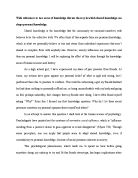Name: Pranav Sharma (25)
Class: 3.15
POD Essay 1
Knowledge
Knowledge as defined by the Oxford English dictionary is "expertise, and skills acquired by a person through experience or education; the theoretical or practical understanding of a subject; what is known in a particular field or in total; facts and information; or lastly awareness or familiarity gained by experience of a fact or situation." Plato, on the other hand justifies it as "justified true belief".
This definition and method of defining knowledge, despit being quite effective and being used for centuries, is far too vague and cannot work in several situations. One reason for this would be that justification can mean importantly different things. For example witnesses can be mistaken, but there may be no better evidence, and no other way to recover the truth, than their testimony. As Will Rogers said, "All I know is what I read in the papers." Thus, Plato's definition of knowledge has a flaw since a false piece of evidence or justification can be considered true if there is nothing else to contradict it. This in turn means that his definition of knowledge is to weak and has loop holes in it.







